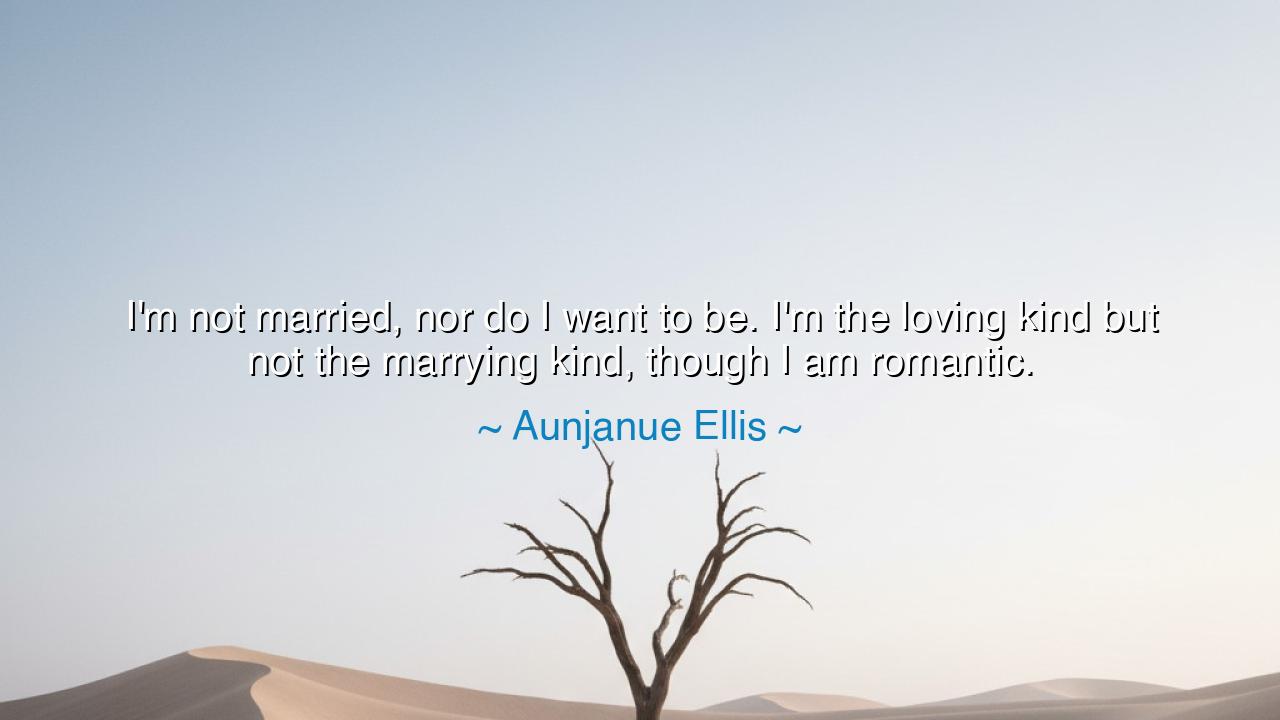
I'm not married, nor do I want to be. I'm the loving kind but not
I'm not married, nor do I want to be. I'm the loving kind but not the marrying kind, though I am romantic.






"I'm not married, nor do I want to be. I'm the loving kind but not the marrying kind, though I am romantic." These words spoken by Aunjanue Ellis speak to a deep understanding of self, and an insightful reflection on romance and the expectations of society. In an age where marriage is often seen as the ultimate marker of commitment and romance, Ellis’s statement challenges this conventional thinking, suggesting that one can be deeply loving and romantic without conforming to the societal pressures of marriage. Ellis embraces the idea that romanticism does not require the formal institution of marriage but can exist freely, in its own terms, defined by the individuals involved, rather than by societal norms.
The ancient Greeks understood love in many forms, often separating it into distinct types such as eros (passionate love), philia (friendship), and agape (selfless love). In their world, marriage was not necessarily seen as the highest form of love, but as a social contract. The romantic ideal—embodied in the stories of Orpheus and Eurydice or the ill-fated love of Pyramus and Thisbe—was often characterized by passion and heartbreak, not bound by the constraints of legal or social institutions. In these stories, love was something that transcended mere union; it was an expression of connection, yearning, and loss, which did not require the legal formalities of marriage to be validated. Ellis’s statement echoes this ancient view: one can love with depth and authenticity, without the need for marriage to define it.
Consider the story of Sappho, the ancient poet from Lesbos, whose work is imbued with an intense sense of romantic passion, particularly in her love for women. Sappho’s poetry is filled with expressions of longing, desire, and devotion. Yet, despite her obvious romantic inclinations, she was not defined by marriage. Her life was devoted to exploring the emotional depths of romantic relationships, whether they conformed to the traditional institutions of her society or not. Sappho's love was pure and unconfined by societal expectations, as she found freedom in her ability to experience and express love on her own terms. Her work, still cherished today, reflects the idea that love is not solely defined by marriage but by the emotional and personal connection between individuals.
In modern society, the institution of marriage often carries with it both expectations and restrictions that may not align with every person’s values or desires. Aunjanue Ellis, in rejecting the idea that she must marry to be a part of the romantic world, aligns with the modern understanding that romance is about connection, not about conforming to prescribed roles. There are countless examples of couples throughout history who have thrived without the formal binding of marriage—whether out of choice, necessity, or the recognition that love can exist on its own terms. George Eliot, the celebrated Victorian author, famously lived with George Henry Lewes, despite never marrying him. Their relationship was deeply loving and rich in intellectual and emotional connection, yet it defied the conventions of marriage, allowing them to explore a different kind of partnership. The love between them was no less real or romantic because it existed outside the boundaries of tradition.
The lesson here is that romance does not need to be defined by the constraints of social expectations, and love is not something that can be confined to a single institution. Aunjanue Ellis offers a powerful reminder that being the loving kind does not necessarily mean adhering to the traditional markers of romantic commitment, such as marriage. Her words inspire us to reflect on what romance truly means for us as individuals, and to embrace love in its many forms. Love and romance are not one-size-fits-all experiences; they are deeply personal, and they thrive when we allow them to grow and evolve according to our own hearts and values.
In your own life, consider how romance shows up for you. Do you feel pressure to fit into the mold of traditional commitment, or can you explore love on your own terms? Take the lesson from Aunjanue Ellis to heart: the most profound connections come not from conforming to expectations, but from embracing love in its most authentic and personalized forms. Whether you are in a marriage, a partnership, or choosing to remain single, let your love be guided by your truth, not by societal demands. Your journey is yours alone to navigate, and true romance comes from genuine connection, not the trappings of convention.
As the ancients knew, and Ellis affirms today, romance and love exist in many forms. They are not bound by a single definition, but are meant to be experienced in a way that is meaningful to each individual. In embracing love for what it truly is—whether or not it takes the shape of marriage—we find the freedom to live authentically and to connect with oth






AAdministratorAdministrator
Welcome, honored guests. Please leave a comment, we will respond soon